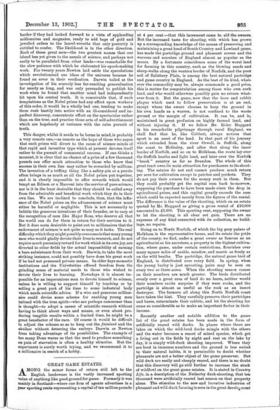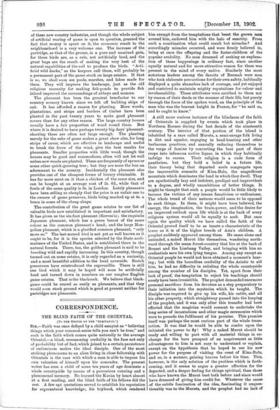GREAT GAME ESTATES.
AMQNG the minor forms of return still left to the English landowner is the vastly increased sporting value of anything like good ground for game. Formerly it was mainlyin Scotland—where one firm of agents advertises in a year sporting rents representing a capital of ten million pounds
at 4 per cent —that this increment came to aid the owners. But the increased taste for shooting, with which has grown up a corresponding knowledge of the means of preserving and maintaining a great head of South Country and Lowland game, has made the partridge ground and pheasant covers and the warrens and marshes of England almost as popular as the moors. By a fortunate coincidence some of the worst land for farming in this country, such as the blowing sands and sheep-walks along the western border of Norfolk, and the poor soil of Salisbury Plain, is among the best natural partridge and game country in England. As the best of its kind, what- ever the commodity may be, always commands a good price, this is matter for congratulation among those who own such land, and who would otherwise possibly gain no return what- ever from it. But the game, now that the hare and rabbit plague which used to follow preservation is at an end, except where the owner chooses to keep the ground in his own hands as a warren, is not confined to the waste ground or the margin of cultivation. It can be, and is, maintained in great profusion on highly farmed land, and without injuring it. If we follow Mr. Rider Haggard in his remarkable pilgrimage through rural England, we shall find that he, like Cobbett, always notices that sport is an asset of the land. In that part of his journey which extended from the river Orwell, in Suffolk, along the coast to Hollesley, and after that along the inner border of Norfolk, and so on to Holkham, the route lay over the Suffolk heaths and light land, and later over the Norfolk " breck " country as far as Brandon. The whole of this great tract owes its main attraction for purchasers to its shoot- ing. The estates do not and cannot produce much return per acre for cultivation except in patches and pockets. They do not pay their owners for the money sunk in them. But they could probably get the capital sum back to-morrow, supposing the purchase to have been made since the drop in agricultural prices, and this capital greatly exceeds the sum which could be expected merely from the figures of the rental. The difference is the value of the shooting, which on an estate quoted by Mr. Haggard as giving a gross rental of 210,000 amounted to 21,000. This sporting rent, supposing the owner to let the shooting, is all clear net gain. There are no expenses of any kind connected.with its collection, no build- inga, no repairs.
Going on to North Norfolk, of which the big grey palace of Holkham is the representative house, and its estate the pride of the county, we find, under a great owner as famous as an agriculturist as his ancestors, a property in the highest cultiva- tion, where game, under certain restrictions, flourishes over many square miles of arable, meadow, and marsh as freely III on the wild heaths. The partridge, the natural game bird of England, is distributed over every field. In spring; when the young barley is just sprouting, pairs may be seen on every two or three acres. When the shooting season comes on their numbers are much greater. The birds distributed evenly over a great area of land do no harm, neither would their numbers excite surprise if they were rooks, and the partridge is almost as useful as the rook as an insect destroyer. The farmers all along this North Norfolk coast have taken the hint. They carefully preserve their partridges and hares, exterminate their rabbits, and let the shooting for sums so considerable as to make an important factor in their income.
Recently another and notable addition to the game list of the great estates has been made in the form of artificially reared wild ducks. In places where there are lakes on which the wild-bred ducks mingle with the others and the water becomes a resort of mined species, which get a living out in the fields by night and rest on the lake by day, it is simply wild-duck shooting improved. Where they are bred in immense numbers and the ground is leas suited to their natural habits, it is permissible to doubt whether pheasants are not a better object of the game preserver. But wild duck are easily and cheaply reared, and there is no doubt that this discovery will go still further to increase the stock of wildfowl on the great game estates. It is stated in Country Life, in a description of the Netherby duck-shooting, that ten thousand were artificially reared last season on that property alone. The stimulus to the new and lucrative industries of pheasant and wildeluck farming is seen in the great development
of these new country industries, and though the whole subject of artificial rearing of game is open to question, granted the fact that mnney is spent on it, the economic result to the neighbourhood is a very welcome one. The increase of the partridge, as that of the grouse, is a pure and unmixed gain, for these birds are, as a rule, not artificially bred, and the great bags are the result of making the very best of the natural capabilities of the soil to produce the birds. "Arti- ficial wild ducks," as the keepers call them, will probably be a permanent part of the game stock on large estates. If that is so, we shall soon see pools, marshes, and lakes made for them. They will improve the landscape, just as the old religious necessity for making fish-ponds to provide fish I inland improved the surroundings of abbeys and manors.
The pheasant has been the greatest benefactor to our country scenery known since we left off building ships of oak. It has afforded a reason for planting. More woods, plantations, and strips and borders of timber have been planted in the past twenty years to make good pheasant covers than for any other reason. The large country houses usually have a fair proportion of wood round them. But where it is desired to have perhaps twenty big days' pheasant- shooting these are often not large enough. The planting merely for the sake of game makes a great show also, for long strips of cover, which are effective in landscape and useful to break the force of the wind, give the best results for• pheasants. Smaller properties with little wood, though the houses may be good and commodious, often will not let well unless new woods are planted. These are frequently of spruce or some other quick-growing tree ; but they are none the less an , adornment to the country. Incidentally the pheasant also provides one of the cheapest forms of luxury obtainable. It has far more meat on it than a chicken of the same size, and can be bought at an average cost of 2s. 6d., while that of fowls of the same quality is 3s. in London. Lately pheasants have been selling so cheaply that the price is an unfair one to the owners of game preserves, birds being marked up at 4s. a brace in some of the cheap shops.
The contribution of the great game estates to our list of valuable birds now established is important and satisfactory. It has given us the six-foot pheasant (Reeves's) ; the exquisite Japanese pheasant, which has a green breast of the same colour as the common pheasant's head; and the large Mon- golian pheasant, which is a glorified common pheasant, "only more so." The last-named bird is not yet as well known as it ought to be, for it is the species selected by the State accli- matisers of the United States, and is established there in the natural forests. There, too, the golden pheasant is said to be breeding wild and rapidly increasing. In this country, though turned out on some estates, it is only regarded as a curiosity, and a most beautiful addition to the local coverside. Scotch preservers have reintroduced the capercaillie. There is still one bird which it may be hoped will soon be artificially bred and turned down in numbers on our rougher English game estates. That is the blackcock. We believe that black. game could be reared as easily as pheasants, and that they would soon stock ground which is good at present neither for partridges nor pheasants.



















































 Previous page
Previous page